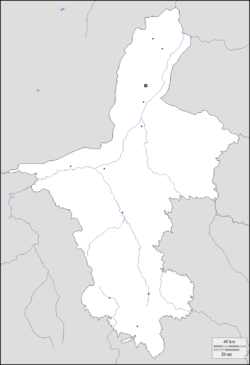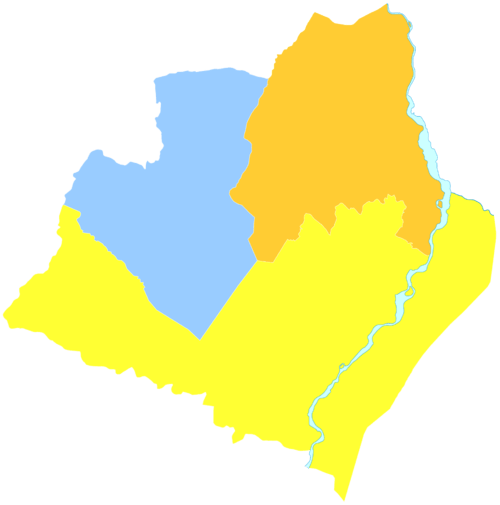Shizuishan
Shizuishan, formerly Shizuizi, is a prefecture-level city in the Ningxia Hui Autonomous Region of the People's Republic of China. It is the northernmost prefecture in Ningxia and the second most populous, after the regional capital Yinchuan, bordered by Inner Mongolia to all directions except the south. Shizuishan sits on the western bank of the Yellow River on the western side of the Ordos Loop. It was formerly a center for caravans traveling the northern routes to and from Beijing across the Ordos Desert.
Shizuishan 石嘴山市 · شِذُوِشًا شِ Shihtsuishan | |
|---|---|
.png) The territory of Shizuishan prefecture-level city (yellow) within the Ningxia AR | |
 Shizuishan Location of the city center in Ningxia | |
| Coordinates (Shizuishan municipal government): 38°59′05″N 106°22′58″E | |
| Country | People's Republic of China |
| Autonomous region | Ningxia |
| Municipal seat | Dawukou District |
| Area | |
| • Prefecture-level city | 5,208.13 km2 (2,010.87 sq mi) |
| • Urban (2018)[1] | 233 km2 (90 sq mi) |
| Population (2007) | |
| • Prefecture-level city | 730,400 |
| • Density | 140/km2 (360/sq mi) |
| • Urban (2018)[2] | 720,000 |
| • Urban density | 3,100/km2 (8,000/sq mi) |
| Time zone | UTC+8 (China Standard) |
| ISO 3166 code | CN-NX-02 |
| Website | www |
| Shizuishan | |||||||||
|---|---|---|---|---|---|---|---|---|---|
| Chinese | 石嘴山 | ||||||||
| Postal | Shetsuishan | ||||||||
| Literal meaning | Stony Beak Mountain | ||||||||
| |||||||||
Name
Shizuishan was formerly romanized as Shetsuishan[3] and Shihchu Shan.[4]
It was also formerly known as "Shizuizi", which was romanized Shihtsuitzu[4][5] and Chetsouidze.[6]
History
Shizuishan used to be a center of local trade and eventually became a mining town.[7] In 1934, Shizuishan was occupied by the army of warlord Sun Dianying during his attempt to conquer Ningxia from the Ma clique. Sun set up a rival provincial government in the town,[8] but he was eventually defeated by Ningxia's official governor Ma Hongkui. Shizuishan was consequently returned to Ma control.[9]
Administrative divisions
| Map | ||||||
|---|---|---|---|---|---|---|
| Name | Hanzi | Hanyu Pinyin | Xiao'erjing | Population (2003 est.) |
Area (km²) | Density (/km²) |
| Dawukou District | 大武口区 | Dàwǔkǒu Qū | دَاءُﻛِﻮْ ٿُو | 230,000 | 1,007 | 228 |
| Huinong District | 惠农区 | Hùinóng Qū | ﺧُﻮِﻧْﻮ ٿُو | 200,000 | 1,088 | 184 |
| Pingluo County | 平罗县 | Píngluó Xiàn | پٍلُوَع ﺷِﯿًﺎ | 290,000 | 2,608 | 111 |
Geography
Shizuishan is located on the western bank of the Yellow River between latitudes 38° 21′ and 39° 25′ N and longitudes 105° 58′ and 106° 39′ E, spanning 88.8 km (55.2 mi) from east to west and 119.5 km (74.3 mi) from south to north.
| Climate data for Shizuishan (1981–2010 normals) | |||||||||||||
|---|---|---|---|---|---|---|---|---|---|---|---|---|---|
| Month | Jan | Feb | Mar | Apr | May | Jun | Jul | Aug | Sep | Oct | Nov | Dec | Year |
| Average high °C (°F) | −0.3 (31.5) |
4.3 (39.7) |
11.2 (52.2) |
19.4 (66.9) |
25.4 (77.7) |
29.6 (85.3) |
31.3 (88.3) |
29.2 (84.6) |
24.1 (75.4) |
17.3 (63.1) |
8.3 (46.9) |
1.0 (33.8) |
16.7 (62.1) |
| Daily mean °C (°F) | −7.0 (19.4) |
−2.5 (27.5) |
4.5 (40.1) |
12.4 (54.3) |
18.8 (65.8) |
23.3 (73.9) |
25.1 (77.2) |
22.9 (73.2) |
17.4 (63.3) |
10.0 (50.0) |
1.6 (34.9) |
−5.3 (22.5) |
10.1 (50.2) |
| Average low °C (°F) | −12.5 (9.5) |
−8.2 (17.2) |
−1.6 (29.1) |
5.5 (41.9) |
11.6 (52.9) |
16.2 (61.2) |
18.9 (66.0) |
17.2 (63.0) |
11.6 (52.9) |
4.1 (39.4) |
−3.7 (25.3) |
−10.3 (13.5) |
4.1 (39.3) |
| Average precipitation mm (inches) | 1.3 (0.05) |
2.2 (0.09) |
5.0 (0.20) |
4.7 (0.19) |
15.1 (0.59) |
24.1 (0.95) |
40.2 (1.58) |
40.2 (1.58) |
23.6 (0.93) |
8.1 (0.32) |
1.8 (0.07) |
0.8 (0.03) |
167.1 (6.58) |
| Average relative humidity (%) | 51 | 44 | 39 | 32 | 37 | 43 | 52 | 58 | 58 | 53 | 53 | 54 | 48 |
| Source: China Meteorological Administration[10] | |||||||||||||
Environmental issues
Shizuishan was once described as the best place to make a film about the end of the world. In 2005, the Chinese government blacklisted the city for its pollution problem and told local leaders to shut down the worst polluting industrial plants. Recently, the city has attempted to reinvent itself by initiating eco-friendly programs to reduce pollution, improving medical services, increasing tourism, and improve certain industries but pollution is still taking its toll on the people.[7]
Economy
The economy of Shizuishan is mainly based on coal mining, coking, and metallurgy. Agriculture, tourism, and viticulture also contribute to Shizuishan's economy.[7]
Education
References
Citations
- Cox, W (2018). Demographia World Urban Areas. 14th Annual Edition (PDF). St. Louis: Demographia. p. 22.
- Cox, W (2018). Demographia World Urban Areas. 14th Annual Edition (PDF). St. Louis: Demographia. p. 22.
- Stanford (1917), p. 12 & xi.
- Pereira (1911), p. 261.
- Huc (2001), Carte.
- Jingli, Song (14 March 2013). "Shizuishan, a coal city to transform". China Daily. Retrieved 12 February 2020.
- Jowett (2017), p. 217.
- Jowett (2017), pp. 217, 218.
- 中国气象数据网 - WeatherBk Data (in Chinese). China Meteorological Administration. Retrieved 2020-04-16.
Bibliography
- Huc, Évariste Régis (2001), Souvenirs d'un Voyage dans la Tartarie et le Thibet, Paris: Éditions Omnibus, reprint. (in French)
- Jowett, Philip S. (2017). The Bitter Peace: Conflict in China 1928–37. Stroud: Amberley Publishing. ISBN 978-1445651927.CS1 maint: ref=harv (link)
- Pereira, George (March 1911), "A Journey across the Ordos", The Geographical Journal (PDF), Vol. 37, No. 3, London: Royal Geographical Society, pp. 260–264, doi:10.2307/1777398.
- Stanford, Edward (1917), Complete Atlas of China, 2nd ed., London: China Inland Mission.
- Teichman, Eric (1921), Travels of a Consular Officer in North-West China, Cambridge: Cambridge University Press.

